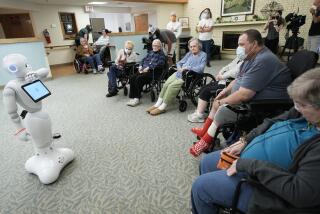Caregivers for Elderly Need More Help
- Share via
For the last two years, my mother, now in her 90s, has needed round-the-clock care. It has meant that I have become a regular commuter from the city where I have lived for the last two decades to our family home in Ohio.
It is an exhausting process. But I am lucky. I have been able to keep my mother in the home she has lived in for more than 50 years. I see her at least once a month, and she is looked after on a daily basis by people who have become a second family for her. My mother has not gotten any better in the last two years, but there is a dignity to her life. She is surrounded by the familiar, and her life is as normal as it can be for someone who needs help going to the bathroom and suffers from the kind of memory loss that means she forgets my name or confuses me with her dead brother.
I have half a dozen friends in the same situation, and in this we are not unique. The 85-and-older population rose 274% between 1960 and 1994 and is the fastest growing group among those more than 65. They are--as the success of such recent books as Mary Pipher’s “Another Country” and John Bayley’s “Elegy for Iris” shows--even getting literary attention.
For my friends and myself, however, the real problems are financial, not literary. Caring for a person like my mother is far more expensive than putting a son or daughter through an Ivy League college. We need help, and without turning the health care system upside down, there is much the government could do right now to make older care more affordable and humane.
* Provide more government help for the elderly or those who care for them. The Clinton administration ha proposed giving a $1,000 tax credit to the elderly or their caregivers, while a Republican proposal would allow an added $2,750 tax deduction to the caregiver (the benefit would vary according to one’s tax bracket, but would be far less than $1,000 for most people). Neither proposal would give as much help as is needed. A more progressive approach would be to give anyone needing long-term care an additional standard deduction (which could be transferred to a family caregiver) for each decade he or she lives to after 70. Such a plan would recognize that health typically worsens with age and that the very old have different needs from the young old.
* Make custodial care a medical deduction. Medicare is very good in paying the costs of an illness. It will even pay for a nurse to make home visits. But the biggest expense for elderly people like my mother lies in having someone around daily to prepare their meals, help them dress and get them in and out of a bath. It is understandable why the Medicare system will not pay for such custodial care the way it pays for doctor care. But there is a good middle ground. If the expenses for such caregivers could be deducted from taxes the way expenses for an operation can, it would be a key step in making home care more affordable.
* Have Medicare pay for all prescription drugs. A variation on this proposal is already on the table. It should be. Those 70 and over will pay on average more than $1,000 a year for drugs by 2000, and, as if that were not bad enough, they will be charged higher drug insurance premiums under Medigap as they age. It is not only medically crucial that such expenses be paid for, the way a doctor visit is, it is also economical in the long run. The elderly who skimp on vital medications because they cannot afford them not only jeopardize their health but, if they live, they end up requiring more expensive treatment for the complications they develop from not taking their prescribed medicines.
* Allow Medicaid to pay for in-home care after an elderly person’s resources have been exhausted. Medicaid will at present pay for nursing home expenses after an elderly person has become destitute. But it will not do the same to help that person live at home. As a result, many elderly are forced into nursing homes because their children can no longer pay the thousands of dollars it costs to keep them at home. If Medicaid were adjusted so that home care were treated the same as nursing home care after an elderly person had spent down his or her assets, we would have far less crowding in nursing homes and far more families able to keep their parents with them until they died.
None of these proposals changes the fact that the ultimate responsibility for my mother’s final years rests with me. But what a difference these measures would make in how I am able to manage and how I am able to plan. In the upcoming election, few other issues will so galvanize my attention and that of my baby-boomer generation.


